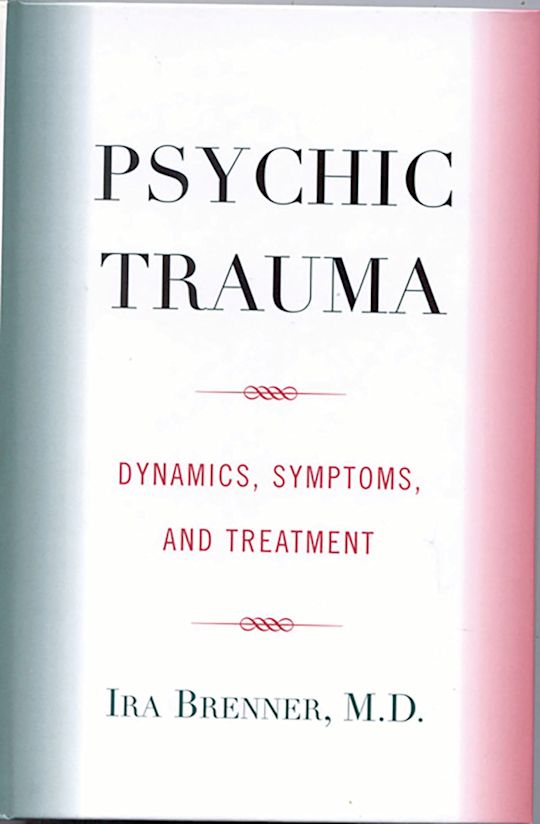- Home
- ACADEMIC
- Psychology
- Psychology - Other
- Psychic Trauma
This product is usually dispatched within 1 week
- Delivery and returns info
-
Free CA delivery on orders $40 or over
You must sign in to add this item to your wishlist. Please sign in or create an account
Description
This book offers a clinical study of psychic trauma and provides a framework through which to understand the long term effects of overwhelming life experiences. Ira Brenner draws on two different populations, those affected by early physical and sexual abuse, as well as those affected by genocidal persecution during the Holocaust.
Table of Contents
Chapter 2 A Longstanding Secret: Mother-Adult Daughter Incest and "The Confusion of Tongues"
Chapter 3 An Elusive Manifestation and an Attempt to Study It
Chapter 4 The Lifelong Persistence of Symptoms: Returning to the Fire
Chapter 5 Intergenerational Transmission: Barbed Wire in the Soul
Chapter 6 An Effect on Development: Unresolved Grief and the Manic Defense
Chapter 7 The Analyst's Own Trauma: Anonymity and Its Discontents
Chapter 8 Falling Asleep on the Job: Facilitation of the Patient's Process or the Analyst's Resistance?
Chapter 9 Can the Length of Treatment Be Shortened? A Psychoanalytic View of E.M.D.R
Product details
| Published | Sep 17 2004 |
|---|---|
| Format | Hardback |
| Edition | 1st |
| Extent | 360 |
| ISBN | 9780765703651 |
| Imprint | Jason Aronson, Inc. |
| Dimensions | 235 x 193 mm |
| Publisher | Bloomsbury Publishing |
About the contributors
Reviews
-
This dynamic and passionate book brilliantly draws the reader into the chaotic and dreadfully injured world of those of our patients who have suffered unspeakable traumas and personality fragmentation. Brenner's evocative and genuine writing style guides one in a deeply disturbing journey, which is so intense it is at times necessary for even the experienced clinician to take a break. Gently and patiently he provides solid benchmarks for the clinician and unfailing hope and compassion for the patients. His dissertation on self disclosure and activity of the analyst is a gem in its own right. Brenner is a leader of a new breed of psychoanalysts who are flexible and open in their theoretical and clinical models and insist on keeping the patients' needs at the center of the treatment, in the best Hippocratic tradition. This is destined to be a classic.
Stuart W. Twemlow, MD, clinical professor of psychiatry and behavioral sciences at the University of Kansas School of Medicine
-
Psychic Trauma is conceptually astute, clinically sensitive, and-that all too rare attribute-it is a pleasure to read. Brenner's lucid exploration of the nuances of intergenerational trauma and Dissociative Identity Disorder is illustrated with rich clinical material and informed by his humane sensibility to the therapist's counter-transference issues. This book is essential reading for all mental health clinicians.
Peter Loewenberg, PhD, dean and chair of the Education Committee of the Southern California Psychoanalytic Institute and professor of history and polit
-
A fascinating exploration of the field of trauma, its dynamics, symptoms and treatment. Through this analytic journey, readers can observe the impact of overwhelming life experiences on those affected by severe early sexual abuse, as well as on those marked by the genocidal persecution of the Holocaust. This is a fine fusing of psychodynamic thinking with interactive and neurological approaches that yields an integrative perspective for a richer understanding of trauma.
Ilany Kogan, training analyst, Israel Psychoanalytic Society; author of The Struggle Against Mourning
-
Dr. Brenner has written a path-breaking and pioneering book, which creates a theoretical and clinical model for the understanding and treatment of severely traumatized patients, whose symptoms are of such gravity that they were hitherto considered unsuitable for psychoanalytic treatment. The book studies the architecture of the human mind and its dynamic processes through case presentations of severely traumatized patients. With each chapter another powerful drama unfolds in front of the reader-its plot being life and transference re-enactments of traumatic neuroses. Dr. Brenner is a passionate and empathic observer whose clinical case studies allow for insight of exceptional depth. He is a careful chronicler of his patients' evolving stories and a powerful facilitator of their treatments. The book presents a variety of traumatized patients, such as victims of incest, of sexual abuse during childhood, and with Holocaust survivors. Dr. Brenner carefully avoids any equations and leaves it to his readers to find resonances between the different classes of 'unmetabolized introjects' of severe trauma.
Dori Laub, MD



































